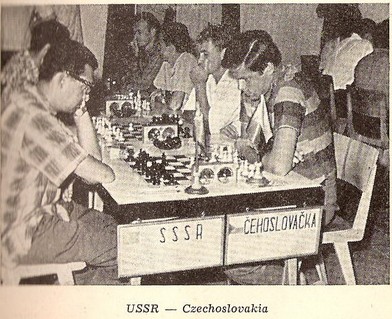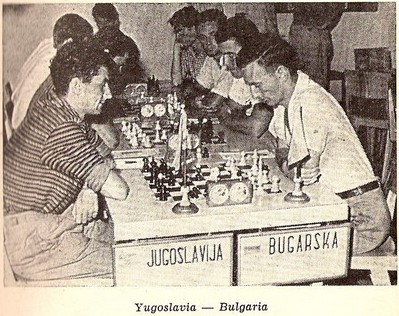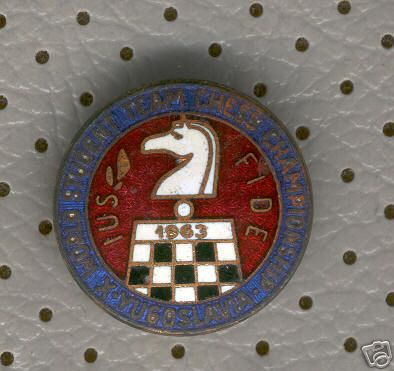|
The FIDE Congress which met in Saltsjöbaden in 1962 entrusted the Yugoslav Chess Federation with organising the Xth Jubilee annual in co-operation with the IUS.
 The competition proceeded from July 6th—21st, 1963 in the picturesque, historic town of Budva at the Adriatic Sea coast belonging to the coastal region of Montenegro. At the opening ceremony 19 teams were present, which means a new record. Among the teams that took part in the contest for the first time, the student teams from Italy and Turkey were welcomed. On account of the large number of teams registered it was necessary to divide them into preliminary groups. The tournament records show us their results. One of the greatest surprises in these preliminary groups is the elimination of the GDR team, which for many years had always been fighting successfully in the final group for some of the top-rank places. The completely unknown team of Italian students in whose ranks we do not find any names known in international chess life, managed to get into the finals. A big fight for advance into the finals went on in the group: USSR, Mongolia and England. This group proved to be very strong. The team of Mongolian students was then a very dangerous adversary to all competitors in the final group, and the English team scored a well-deserved victory in group B before the favoured team of the GDR. The competition proceeded from July 6th—21st, 1963 in the picturesque, historic town of Budva at the Adriatic Sea coast belonging to the coastal region of Montenegro. At the opening ceremony 19 teams were present, which means a new record. Among the teams that took part in the contest for the first time, the student teams from Italy and Turkey were welcomed. On account of the large number of teams registered it was necessary to divide them into preliminary groups. The tournament records show us their results. One of the greatest surprises in these preliminary groups is the elimination of the GDR team, which for many years had always been fighting successfully in the final group for some of the top-rank places. The completely unknown team of Italian students in whose ranks we do not find any names known in international chess life, managed to get into the finals. A big fight for advance into the finals went on in the group: USSR, Mongolia and England. This group proved to be very strong. The team of Mongolian students was then a very dangerous adversary to all competitors in the final group, and the English team scored a well-deserved victory in group B before the favoured team of the GDR.
The final rounds were a real horror. On penultimate day Bulgaria dispelled all of their hopes losing 3—1 to the Netherlands while Czechoslovakia squeezed Italy 4—0. As the last adjournment session came Bulgaria were leading Czechoslovakia 2—0 and Yugoslavia were leading USA 2½—½. Yet Chipev of Bulgaria fell into time trouble and lost to Augustin. Minić of Yugoslavia had a won ending vs Weinstein (we are very sorry but this game is lost!) but lost and the challenge trophy went to Prague. Yugoslavia came second ahead of Bulgaria steal a match on the Soviets.
 The finals brought the young team of Czechoslovak students a success according to their merit. Composed of Hort, Jansa, Janata and Trapl — substitutes Augustin and Kupka — this team won first place by half a point before the home team of Yugoslavia, thus becoming world champion again after ten years. The entire collective fought with enthusiasm and in a balanced manner. During the whole championship they were defeated only in one contest, i.e. in the last round against the chess players of the Bulgarian People's Republic. The finals brought the young team of Czechoslovak students a success according to their merit. Composed of Hort, Jansa, Janata and Trapl — substitutes Augustin and Kupka — this team won first place by half a point before the home team of Yugoslavia, thus becoming world champion again after ten years. The entire collective fought with enthusiasm and in a balanced manner. During the whole championship they were defeated only in one contest, i.e. in the last round against the chess players of the Bulgarian People's Republic.
The Yugoslav team were among the greatest favourites on their home soil. The fight for the first place was dramatic almost until the end of the last game of the whole championship. However, in the Yugoslav student team the achievements of the grandmasters Parma and Nemet were not of the expected quality.
 For a very long time the team of the Bulgarian students, who won third place, belonged to the most serious candidates for the gold medal. But their hopes were foiled by the crushing defeat they suffered in the last but one round from the Dutch student team, which fought with enthusiasm and high sports discipline and won 3—1. For a very long time the team of the Bulgarian students, who won third place, belonged to the most serious candidates for the gold medal. But their hopes were foiled by the crushing defeat they suffered in the last but one round from the Dutch student team, which fought with enthusiasm and high sports discipline and won 3—1.
The students of the Soviet Union, who had repeatedly emerged victorious, had to content themselves with fourth place this time. Not a single member of the team was the holder of an international title. and some of them took part in the contest for the first time. After they win further experience, there is no doubt that the team will again be able compete for first place.
The USA chess players likewise had only two experienced players in their team, the grandmaster Lombardy and the international experience, and they too may, in the years to come, compete successfully for a better place than the one they gained this year by occupying the fifth place.
 Appreciable success was registered by the Dutch students, who scored sixth place. The collective of the team fought with enthusiasm in each contest and was a dangerous adversary to all. Appreciable success was registered by the Dutch students, who scored sixth place. The collective of the team fought with enthusiasm in each contest and was a dangerous adversary to all.
Seventh place was scored by Poland, and eight by Mongolia. Both teams had well-balanced collectives and the result was success for both teams.
A comparatively weak achievement was that of the Hungarian students this year, and Italy, a newcomer to the competition, was successful by the mere fact that it fought its way trough to the final group A.
In group B the pleasant-mannered students from England proved rather successful by overtaking the favoured chess players from the GDR. The representatives of the Scandinavian countries, teams from Finland and Sweden, scored 3rd and 4th place, which on the whole corresponds to their capacities. Tunisia had improved, and more had been expected from the Cuban team. The other teams in general placed according to their forces.
 The fights on the chessboards went on smoothly and there was not a single incident that would have to be resolved by the arbitration committee. This is a further confirmation of the fact that the fights were carried on in a friendly sporting spirit, which had been a characteristic feature of all previous annual world team championships. The smooth running of the entire championship also goes to the merit of the main international referee Bože Kažič who together with the other members of the referee staff directed the entire competition in every tactful manner. The fights on the chessboards went on smoothly and there was not a single incident that would have to be resolved by the arbitration committee. This is a further confirmation of the fact that the fights were carried on in a friendly sporting spirit, which had been a characteristic feature of all previous annual world team championships. The smooth running of the entire championship also goes to the merit of the main international referee Bože Kažič who together with the other members of the referee staff directed the entire competition in every tactful manner.
Moreover, the very good work of the organising committee ought to be emphasised, which, under the leadership of the President of the Yugoslav Student Union, Novák Pribičević, his substitute Vukosav Stanić, the director of the championship Slavoljub Ivkovič and other members of the committee, ensured very good conditions for the successful procedure of the whole championship. Substantial help was rendered to the organisers also by the responsible political officials of Budva.
A fine excursion was organised for the participants to Cetinje, to the Lovčen and to Kotor, which offered them an opportunity to acquaint themselves with the natural beauties of the Montenegro region. A boat trip to nearby St. Stefan, Miločer and other coastal places showed participants the beauty of the Montenegro Adriatic coast.
 When prizes were distributed to the winners on Sunday, June 21st, in the evening on the terrace of the "Avala" hotel at a closing ceremony of the Xth Jubilee Student Chess Olympiad — a title, which rightly is making its way into the Chess press, I am convinced that the overwhelming majority of participants were very sorry to leave the picturesque small town of Budva that had been host to them for 15 days. When prizes were distributed to the winners on Sunday, June 21st, in the evening on the terrace of the "Avala" hotel at a closing ceremony of the Xth Jubilee Student Chess Olympiad — a title, which rightly is making its way into the Chess press, I am convinced that the overwhelming majority of participants were very sorry to leave the picturesque small town of Budva that had been host to them for 15 days.
The Yugoslav Chess Federation belongs to the most active federations of FIDE and has already been the organiser of a whole series of most important FIDE competitions.
In co-operation with the organising committee and with the IUS it ensured the organising of the Xth annual of the World Student Championship, which proved a success in every respect and confirmed the correctness of FIDE's slogan, "Gens una sumus". We wish to express our sincere thanks to FIDE and all those who contributed to this success.
/ IM Jaroslav Šajtar, Vice-President of the FIDE /
|

